Welcome to 2014 From Mary Ellen
Greetings in 2014!
Hard to believe it’s yet another year closing in on us, and I hope it finds your family safe, well and thriving. I am celebrating the holidays this year with two out of three of my adult children coming home and that is exciting! The togetherness we felt when they were growing up was something I guess I never really expected would change. (Of course I mentally knew, but it is something I could not get my mind and heart around until it actually started to happen.) But of course, it does. College, marriage, careers; they take our children where life would have them, even as it took us to sometimes unexpected places. Life is a process, isn’t it?
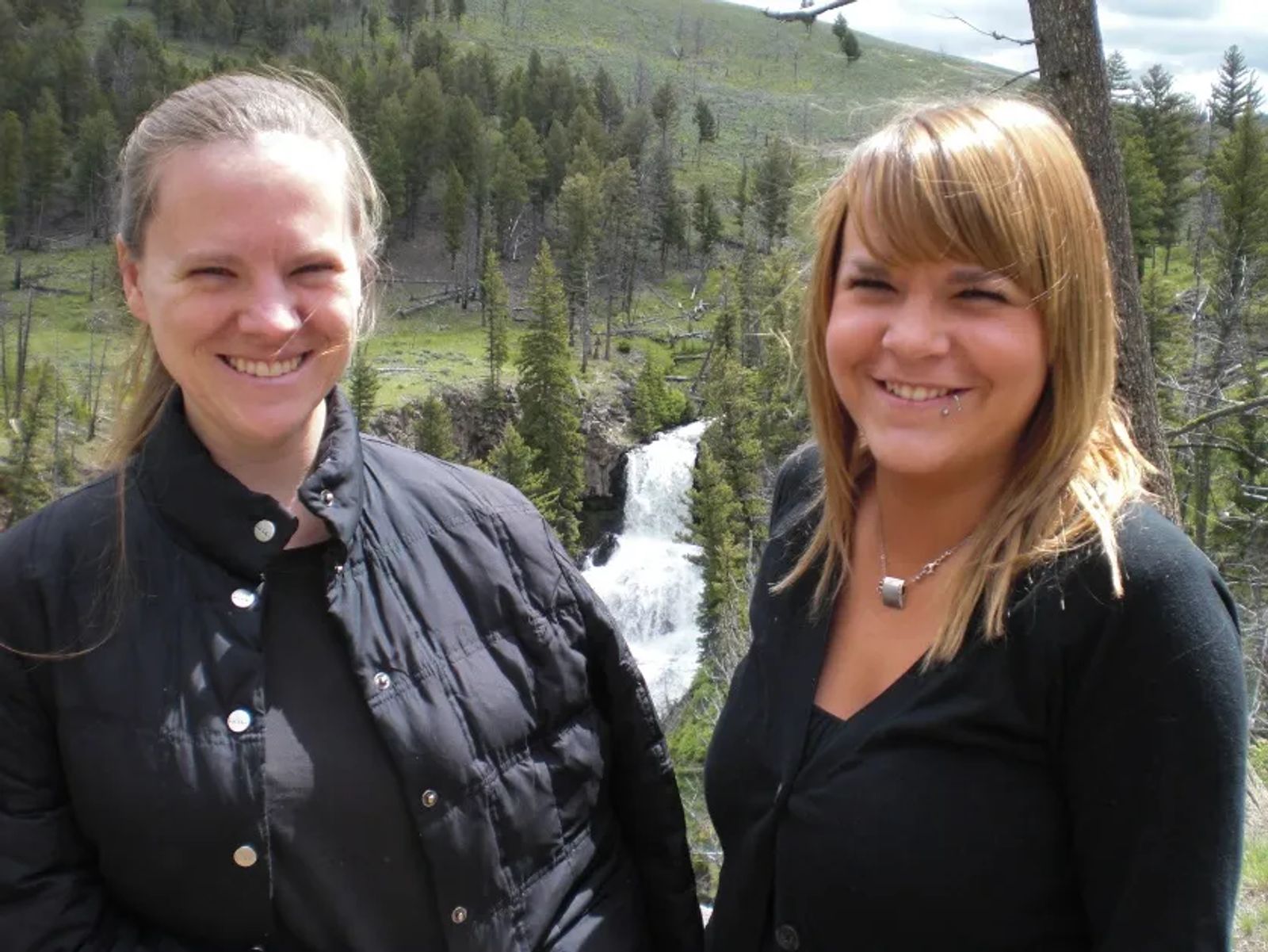
My girls, Lydia and Lenore
I’d like to start this year out by sharing with you some thoughts that have been upon my heart as I begin to reflect on this last year and on the amazing career in Montessori, which has taken me to so many places and to such opportunity to keep going deeper in my understanding. I have truly been very blessed.
Choice and Selfhood
Each of my children and the many children I have been privileged to teach and to know have been so very different. In the beautiful Montessori environments where I have taught I saw each child gravitate to different lessons and develop quite different interests and skills, even as they all learned to read and write and compute. Montessori wrote: “There is in man a special attitude to external things, which forms part of his nature, and determines its character. The internal activities act as cause; they do not react and exist as the effect of external factors. Our attention is not arrested by all things indifferently, but to those that are congenial to our tastes. The things which are useful to our inner life are those which arouse our interest.”
This simple message of respect and honor of the unfolding inner life of the child is to Montessori schools a hallmark of practice. It is exciting to be involved in an educational program that is not rote and is not based on a mechanical idea that every day in every grade we have a specific topic to cover. It is based on knowing the developmental path children will take and helping it move along that continuum essentially by the child’s own, self-chosen efforts. We recognize that not all three-year-olds want or need the same lesson. Neither do all four-year-olds, or five-year-olds, or all children of any age for that matter! As Montessori teachers and parents we may act as the dynamic link between each child and the prepared environment. We help them find work that suits their interests and capabilities. When we take this role, we have the joy of discovering what calls to each child to whet his appetite for learning and what brings each one to peaceful concentration.
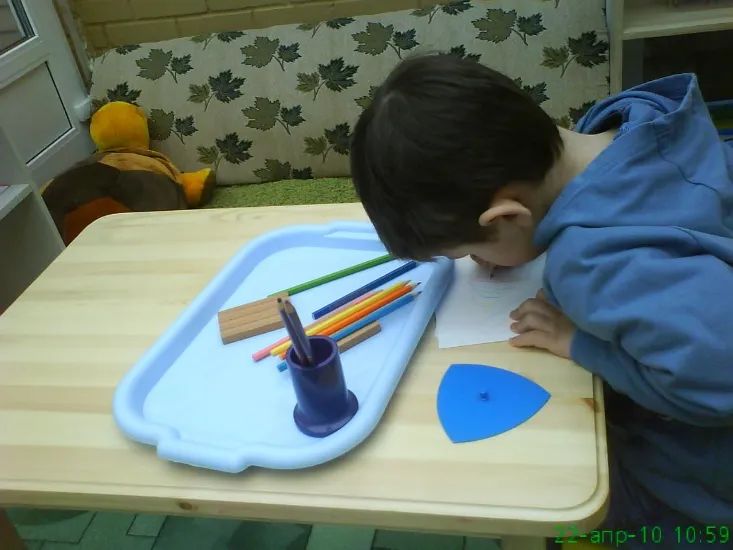
Justice is giving each one what he or she needs, not trying to give them all exactly the same thing. In this lies the power of what Montessori education offers to our children. In this lies the liberation of each one’s unique and particular genius. It allows a child to forge ahead to fifth grade reading and plug along at first grade math while still five years old, or soar in geometry and geography while not quite up to par in reading or music. The power of constructive choice in a well-prepared environment is what we can give our children in a Montessori classroom and in our thoughtfully prepared homes.
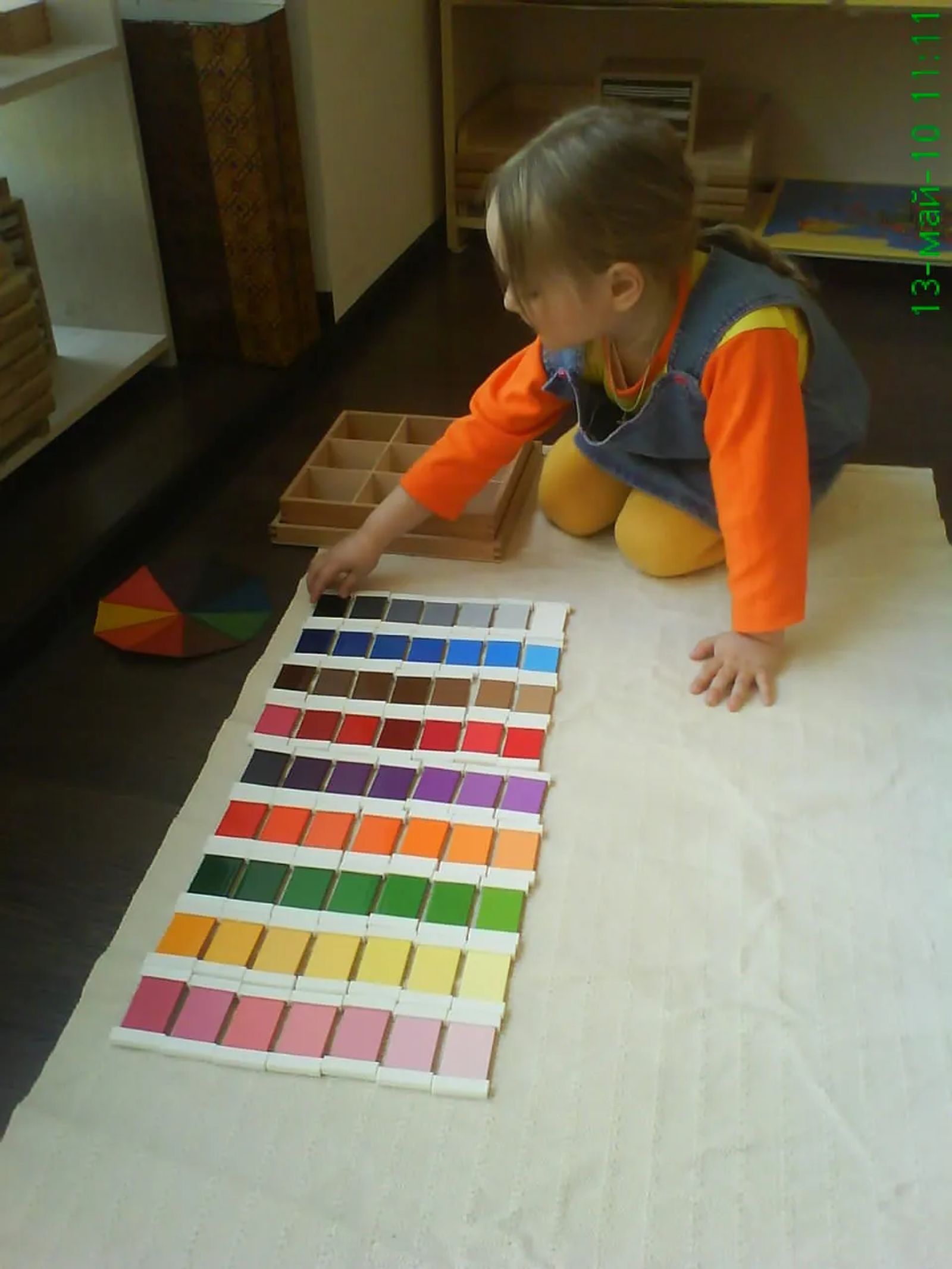
Children freely choose their work in a Montessori school in Tikhvin, Russia.
Environment
The reality of a structured environment where we can offer choice and still assure the best developmental outcomes is the genius of Maria Montessori. No other educational system works for all ages. There is Montessori for pregnant moms, infants and toddlers, preschoolers, elementary children, and junior and senior high students. How can that be? Simply because it is based on the principle of “help to life.”
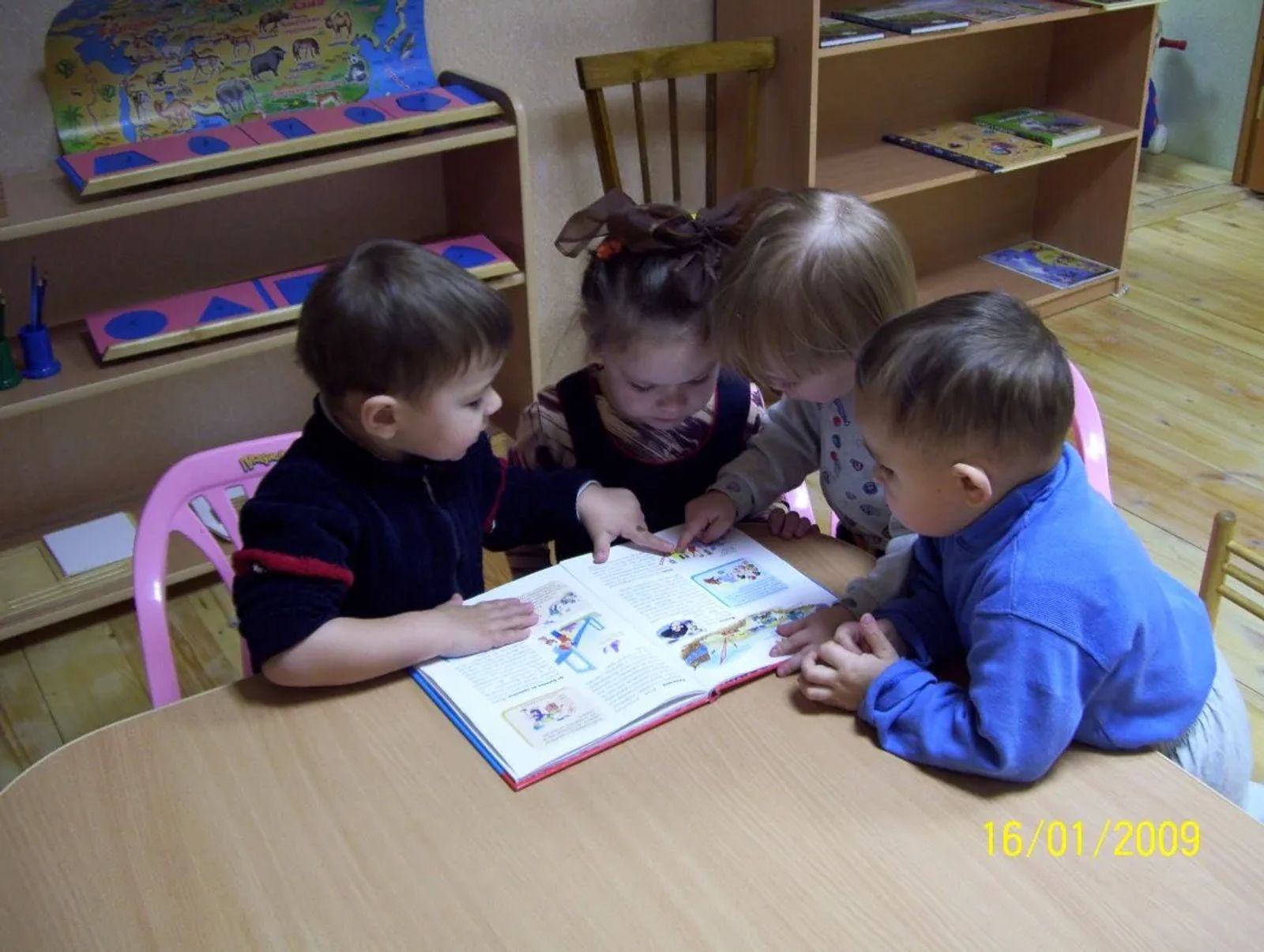
Recent Observations
In the past several months I have had the opportunity to observe Montessori classrooms in five states. Some were intern placements, a few others just because I love to observe children. I want to share with you some of the best I saw because it relates so closely to the idea of the previous paragraph that life takes our children where it takes them. It happens much earlier than college, marriage and career in a good Montessori classroom!
One of the best classrooms I observed had around 28 children. There were three teachers who had a well-established routine of taking turns giving lessons and keeping an eye on the whole group. The most interesting thing was that virtually every child was working on whatever lessons he or she wished to do. One little girl worked at winding thread around little sheets of cardboard, getting the thread ready for others to do embroidery work, for over an hour. What great experience in fine motor control and concentration! A number of children were absorbed in tracing maps and writing the names of the states of countries. One little boy did the “Big Display” of beads and symbols from 1 to 9,000.
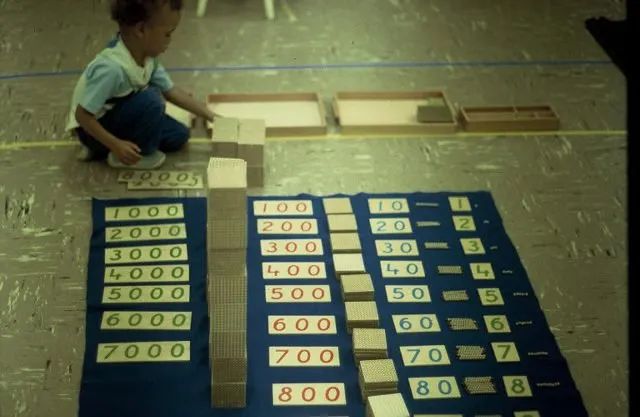
Teachers gave lessons and then seemingly disappeared into the woodwork. There was no compulsion; hence, there was no reaction to compulsion, there were no tantrums or major misbehaviors, and there was little wasted time.
Making a “Mistake”
One particular four-year-old child stands out in my mind. She was doing a simple lesson of pouring rice, a universally standard Montessori task in what we call “Practical Life” or “Motor Control through the Exercises of Practical Life.”
 Well, the best way I can describe it is that she got all tangled up in it. Her two hands overlapped, her hand slipped and she spilled rice all over the table and floor. In a well-run Montessori environment, a spill is no big deal. No one reacts; no one is in trouble. We have already given lessons on using a broom and dust pan and so the child simply cleans it up, and often another child or two will offer to come help.
Well, the best way I can describe it is that she got all tangled up in it. Her two hands overlapped, her hand slipped and she spilled rice all over the table and floor. In a well-run Montessori environment, a spill is no big deal. No one reacts; no one is in trouble. We have already given lessons on using a broom and dust pan and so the child simply cleans it up, and often another child or two will offer to come help.
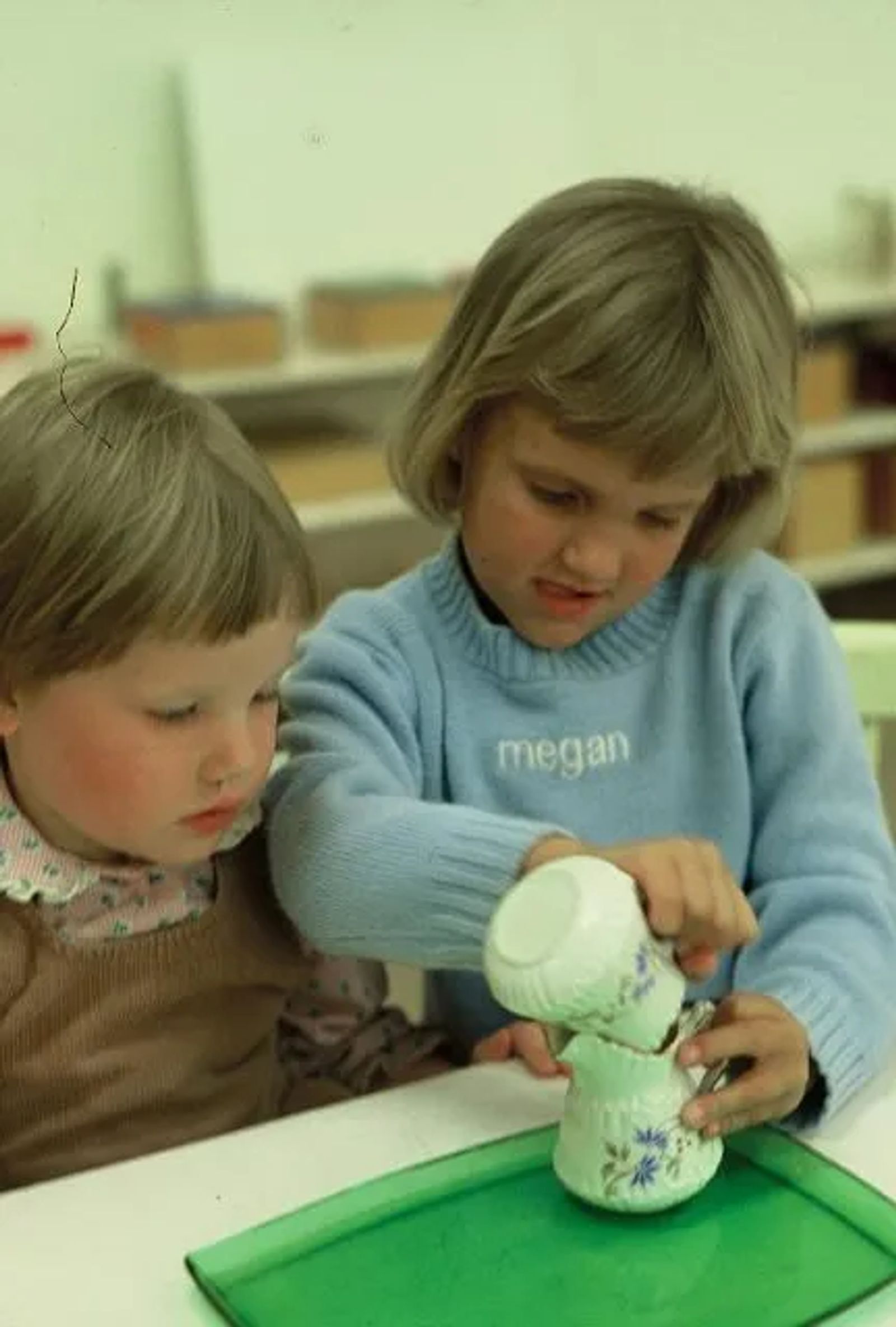
In this case, the little girl more or less used the broom as a device to spread the rice over fully half the classroom. She patiently tried to clean up the mess, but her coordination and distractibility interfered, and finally she put the broom away and went on to another task. It was not obvious to me whether any of the teachers actually saw it all, but sure enough, when one of them completed a highly concentrated lesson with another child, she casually walked over to the little girl and asked if she’d like help cleaning up the rice. Again, no compulsion, no chastisement; just loving help.
A little while later, the same little girl was doing a color mixing lesson with paints and managed to get paint all over the sleeves of her sweater. Another teacher looked at her, laughed and suggested they put a clean shirt on her and rinse that one out. I could not help but think of other children I have seen in some classrooms in trouble all morning, getting “disciplined” and yelled at for their childish mistakes. This child was simply loved through her problems.
Another little boy, who I discovered from the teacher has Asperger’s, had been working fairly well on a lesson, then started wandering aimlessly around the classroom. He was invited to go out on the adjacent porch to sweep the leaves and twirl for a while. His teacher knew that ten minutes of this would enable him to come back into the classroom.
These two children, either or both of whom might have been labeled as failures in another classroom, were thriving in this one. Every mother and father can take a lesson from these teachers, who set high standards early in the year of using work time and kindness to one another, and then trusted the process of each child growing and expanding that unique life that is within.
Inspiration from Montessori
As I have studied Maria Montessori’s writings again and again over four decades, I continually find new inspiration. To me, her wisdom is profound. Another one of the children I observed was putting away the red rods, a material used to assist a child clarify perceptions of length. She had laid the rods at random, and made a number of mistakes in which one came before the other in length. She was making judgments and self-correcting herself quite nicely without any adult interference doing it for her. Montessori wrote: “Our little children are constructing their own wills when, by a process of self-education, they put in motion complex internal activities of comparison and judgment, and in this way make their intellectual acquisitions with order and clarity; this is a kind of “knowledge” capable of preparing children to make their own decisions.”
Executive Functions of the Brain
Making decisions to use this material rather than that material, to work at this table or at that table, to work with someone or alone; all of this constitutes practical experience using the executive functions of the brain. These examples may help clarify why Montessori has been identified as the best educational system to develop executive functions. We cannot tell our children what to do, how and when to do it all the way through school and then expect them to be a mature person capable of making decisions when they leave for college.
Child Development
The more we can understand the developmental needs of our children and structure an environment that not only honors but takes educational advantage of these needs, the better each child’s development will be. To this end I have prepared a short course in child development that will soon be available online. It will last six weeks and include videos, narrated slideshows, online text and forums so you all can share your thoughts and problems at different stages of your child’s (or your class’s) development. All the information I deliver is based on the study of Montessori’ insights on the stages of development along with other major child development experts. Most is originally from the Age of Montessori teacher education course, but packaged especially for parents and teachers who want a specific portion of the content. Additional mini-courses will also soon be released on successful early reading and the concepts you need to help your child learn math.




















